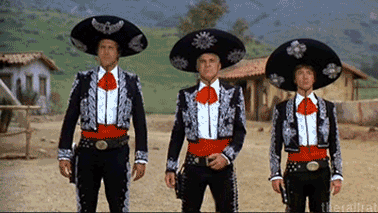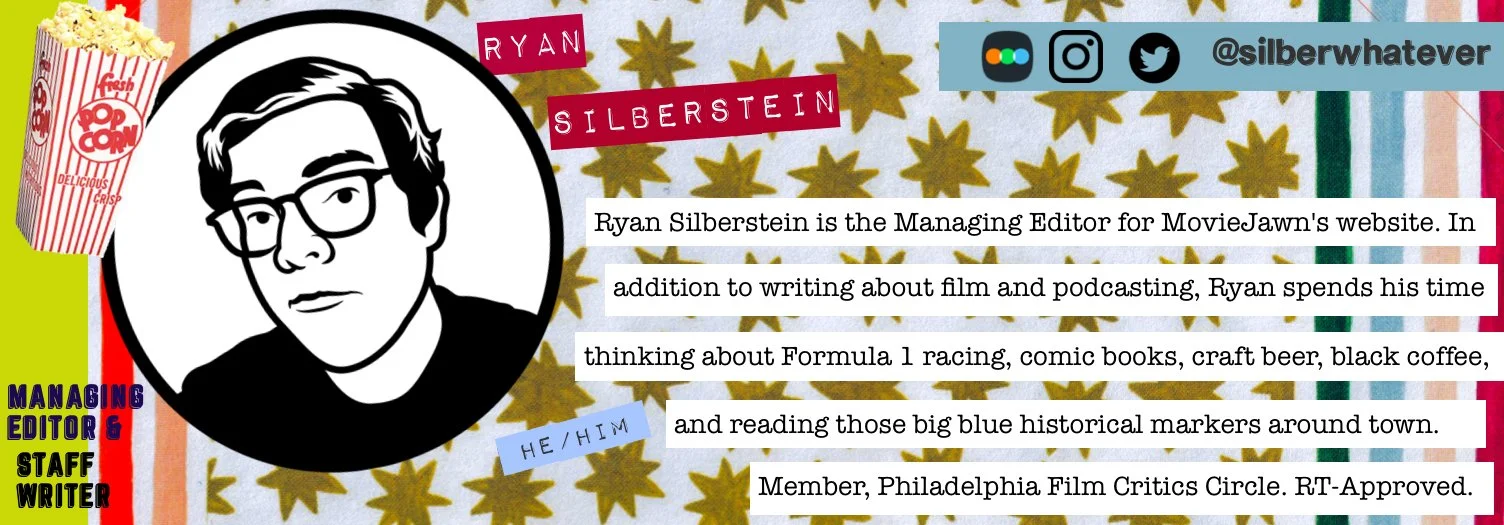Printing the Legend: Finding some smiles
by Ryan Silberstein, Managing Editor, Red Herring
There have been comedy westerns as far back as the silent era, with Harold Lloyd, Buster Keaton, Charlie Chaplin, and Douglas Fairbanks all spoofing the genre over a century ago. The only one I’ve covered here so far is Destry Rides Again, though I considered Cat Ballou and Blazing Saddles to slot in for this first year. But I wanted to take advantage of the dearth of good 1980s westerns to schedule some comedies in here. Both ¡Three Amigos! and City Slickers interpret the genre in different ways, but they also rely on Baby Boomers’ nostalgia for the films of their youth, offering a commentary on how the western slots into more contemporary culture.
¡Three Amigos! is the lesser of the two, and not just because it was directed by known asshole John Landis. The plot adds a Seven Samurai ending onto a Galaxy Quest/Tropic Thunder story about actors hired for the skills they display on screen. The titular Amigos are Dusty Bottoms (Chevy Chase), Lucky Day (Steve Martin) and Ned Nederlander (Martin Short), three turn of the century silent film actors who star in swashbuckling pictures about wealthy landowners who care about the common man. When their latest flops, their cushy lifestyle is stripped away by the studio in one of the funniest scenes of the whole movie. They then receive a telegram asking them to come to a small Mexican town. We, the audience, already know that the desperate plea is not for the actors to perform, but for their characters to defeat the local bandit, El Guapo (Alfonso Arau).
Co-written by Steve Martin, SNL creator Lorne Michaels, and Randy “You’ve Got a Friend in Me” Newman(!), Amigos is perhaps somehow less insensitive than many other 1980s comedies I can think of, which was a pleasant surprise. It helps that I adore Steve Martin and Martin Short. Seeing that this, their first collaboration, already show signs of their chemistry that continues all the way through this year’s season of Only Murders in the Building is maybe my favorite aspect of the film. The less said about Chevy Chase the better, though I’ve always enjoyed his screen presence despite him also being a raging asshole (apparently he and Landis almost came to blows over a crack Chase made about the Twilight Zone incident, which was playing out legally during the filming of Amigos).
Perhaps most interestingly from a genre perspective, Amigos might technically be a Zapata western. Typically thought of as a subgenre of spaghetti westerns dealing with the Mexican Revolution, the setting and the critique of capitalism within makes it sneak under the boundaries of this definition. The plot is driven by the need for money, in part to contrast the cash-poor actors with their on screen personas, but at the end, the Amigos refuse the town’s cash reward. They ride off after reciting their fictional selves’ mantra, "Wherever there is injustice, you will find us. Wherever there is suffering, we'll be there. Wherever liberty is threatened, you will find The Three Amigos!" In helping the townspeople, they have found their moral centers and realize what actual injustice looks like. The characterization of the three leads supports this reading, despite this being a silly movie.
City Slickers is also about a trio of friends who find themselves in over their heads. Three New Yorkers, Mitch (Billy Crystal), Ed (Bruno Kirby), and Phil (Daniel Stern) take a working vacation to a real ranch in order to resolve their midlife crises. There they learn to be cowboys under the tutelage of the trail boss, Curly (Jack Palance) and participate in a cattle drive from New Mexico to Colorado. The trip was inspired by Mitch’s childhood love of westerns, and there are a few key references to other movies and television shows in the genre. The Bonanza theme is sung at a key moment, Curly is named after a character in the superb Sergio Corbucci western The Mercenary, and Howard Hawks’ Red River is “yee haw” checked at the beginning of the cattle drive.
While much of the comedy is driven by Billy Crystal’s wisecracking schtick, the rest of the cast also get great lines and comedy moments to deliver. Enjoyment of the film overall might depend on how funny the viewer finds Crystal, but there is a lot more substance within City Slickers than its buddy comedy first impression.
The three leads not only have excellent timing and chemistry with each other, but the script treats their psychological issues seriously. Phil is trapped in a marriage he hates and accidently implodes his life by giving a pregnancy scare to a cashier at the grocery store he works at which is owned by his father-in-law and needs to regain his dignity. Daniel Stern navigates the role perfectly, giving Phil a big heart while showing his resignation and eventual escape. Ed is newly married to an underwear model 15 years younger than him, and is worried about becoming a father, stemming from him kicking his own father out of their house for cheating on his mother. Burno Kirby was a terrific character actor and, like When Harry Met Sally a few years earlier, City Slickers showcases his snappy line delivery and capacity for building a rich character through performance beyond just dialogue. Mitch’s midlife crisis is more related to his job, but also the most relatable as he sleepwalks through his late 30s.
Although Curly chastises them for thinking that two weeks on a cattle drive will stitch their broken selves back together, it does end up working. City Slickers uses its setting, unfamiliar to the characters except in their fantasies, as a way to separate them from their day to day lives. It sympathizes with the distractions of modern life (which have only gotten worse in the last 31 years since its release) and how they can obstruct us from keeping ourselves focused on the important things. Jack Palance is perfect as Curly, dispensing sage wisdom and creating fear in equal measure. He’s not actually in the film all that long, but he’s the catalyst for much of the psychological resolution. City Slickers can easily be critiqued for some of its maudlin elements, but they often feel earned. This is helped, in part, because it looks like a real movie, and the action scenes during the cattle drive are coherent and visceral.
While not as deeply immersed in the genre as the contemporary Back to the Future Part III, both ¡Three Amigos! and City Slickers show the indelible mark the western has had on American cinema. All three films use nostalgia for the movies and television of the 1940s-1960s as the basis for their view of the West, or to contrast it against the “real” West (or the revisionist westerns Marty McFly favors in BTTF). The West taps into the feelings of self-reliance that are embedded within the concept of American masculinity, but all three of these films also undercut that through the interdependence of their male leads. City Slickers spotlights this most directly, as Ed kisses Mitch’s forehead after helping to save him from a river. There’s a tenderness and vulnerability in each of the male-male relationships in City Slickers that creates additional emotional resonance. Maybe the West is the only setting where men are allowed to cry, other than baseball games of course.
Next month: Dances With Wolves






